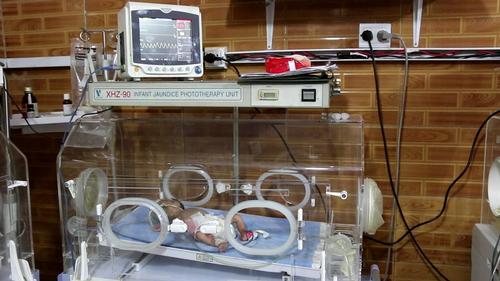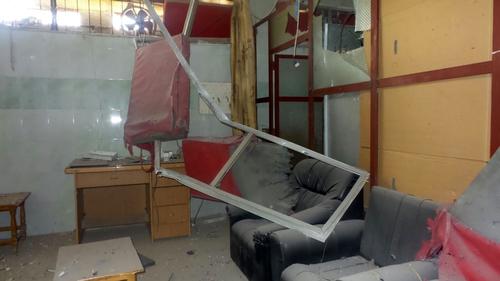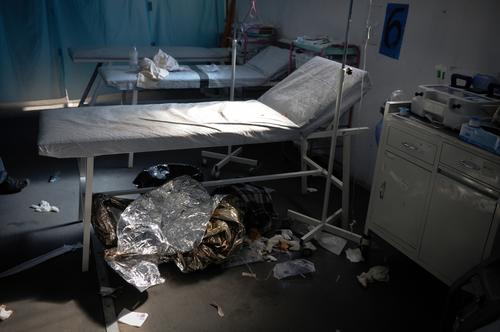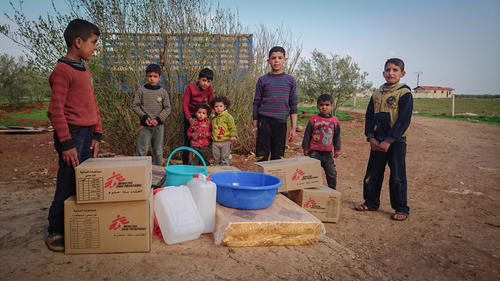Women struggling to access maternity services and care for newborn children.
Even as the bombs fall on east Aleppo, babies are being born in the besieged city. For their mothers, experiencing pregnancy and childbirth in such desperate conditions is extremely challenging, both physically and psychologically.
The difficulties begin in early pregnancy. The siege has led to severe food shortages, and many pregnant women are undernourished, which can lead to severe anaemia and other health problems.
“Because of the food shortages and lack of good nutrition, a lot of pregnant women suffer from severe anaemia and low blood sugar, which can make them vomit or lose consciousness,” says Umm Wassim, a midwife who has been delivering babies in east Aleppo for 20 years. “Often, the anaemia is so severe that they need a blood transfusion.”
Because of their mothers’ poor diets, many babies are born underweight. The stress of living under siege and bombardment has also led to an increase in babies being born prematurely. “When conditions are really bad, a lot of women are scared and suffer psychological stress,” says Umm Wassim. “[As a result] the number of premature babies has definitely increased.”

Pregnancy in East Aleppo
Even before the current bombardment, women struggled to reach east Aleppo’s one dedicated maternity hospital and the two other hospitals that offered maternity services. This was because of transport difficulties due to fuel shortages, and the danger of moving around the city under shelling.
“More women have been giving birth in the street, or at home, especially if their labour happens at night,” says midwife Umm Wassim. “Often women don’t arrive at hospital until after they have given birth.”
But this month, hospitals have come under attack again from airstrikes – including the only children’s hospital in the besieged area, the largest general hospital and three surgical hospitals, all of which went out of service. With such limited access to medical care, even pregnant women with complications may have to give birth at home or in local health centres, which offer only minimal services.
“There are no doctors around here,” says a midwife working in the basement of a health centre. “The only thing we do is gynaecological examinations. We don’t have a paediatrician. We don’t have incubators. There’s no medical equipment.”
After giving birth, many undernourished mothers struggle to produce enough milk to breastfeed their babies. Formula milk is no longer available, so parents are forced to feed their babies on unsuitable foods such as ground-up rice or bulgur wheat.
Some mothers feel desolate at bringing a baby into such a world. “For me, in these conditions, I think it’s a huge mistake,” says one new mother. “After I gave birth, I felt so sad. Did I give birth to him to see a life like this?”
But others still regard the birth of a baby as something to celebrate. “The situation in east Aleppo is a tragedy,” says Umm Wassim. “We’re not used to all this fighting and bombing – it’s getting worse day by day. But despite all this, it’s still a happy occasion when a baby is born – why wouldn’t it be?”
East Aleppo: “Did I give birth to him to see a life like this?”
Testimony from a mother who recently gave birth in east Aleppo
“The siege has been bad, but we didn’t fear it as much as we fear the bombs.
The siege has been bad, but we didn’t fear it as much as we fear the bombs.Umm Leen, a mother who recently gave birth in east Aleppo
My name is Umm Leen. I’m a mother of seven and I’ve never been outside east Aleppo, from the day I was born until now.
My eldest daughter is 16. She was six months pregnant, but suffered a miscarriage two weeks ago. I had a son of 12, but he was killed by a piece of shrapnel which pierced his heart. My youngest is a baby boy, aged three months. I gave birth to him during the siege.
I gave birth a month early, because of panic attacks and the heavy shelling.
In the past two years, I’ve had miscarriage after miscarriage, and this pregnancy too was full of problems. I went into threatened premature labour in the second and third month, and had to visit hospital every 10 days. I had low blood pressure, severe anaemia and low calcium levels. I was always tired and dizzy.
Because of the siege, there are shortages of all kinds of foods. There are a lot of underweight babies because of their mothers’ diets.

In the first week of August, the midwife told me to prepare myself for the birth and buy the drugs I needed. I got the medications from pharmacies, as they weren’t available in hospitals.
Two days later, at 5am, my waters broke. There was no one to take me to the hospital, and there was no public transport, either. We couldn’t call an ambulance – there is so little fuel that ambulances only come for the most critical cases. In the end, my husband stopped a car in the road and begged the driver to take us to any hospital.
There was very intense shelling, and we didn’t know if we would make it. He drove at incredible speed because of the bombardment – we got there in just 12 minutes. My biggest fear was that we would run out of fuel in the middle of the road with the shells raining down around us.
During the labour, I was on my own. There’s no one here in east Aleppo from my or my husband’s family – we are the only ones left. My husband waited downstairs.
Five hours later, I gave birth. It was after I delivered the baby that the problems began. I was haemorrhaging, so they put ice bars on my stomach and inside my womb to try and stop the bleeding.
I did my best to breastfeed the baby, despite having had nothing to eat and being undernourished.
I was discharged on the same day, because the shelling was so intense and the hospital was inadequately protected. After I left the hospital, four missiles exploded right in front of the building.
My baby stayed on in the hospital for another 15 days. He weighed just 1.2 kilograms and I didn’t expect him to live. But he has hung on.
In August, during the early months of the siege, things weren’t as bad as they are now. They still had formula milk in the hospital, so they’d fix a bottle for my baby and feed him, or else I would express my milk into a bottle and feed it to him.
But now there’s no formula milk around, and I’m grinding up rice and feeding it to him instead of milk. He is losing weight and is very weak. Am I supposed to sit and watch him die in front of me?
My other children are all incredibly thin, too, because we have almost nothing to eat.
We haven’t had any nappies for three months, so people are using rags instead, but this gives the babies rashes. My daughter has a very bad cough, but the children’s hospital has been bombed and I don’t know where to take her. The baby has difficulty breathing, as well as other health problems, but we can’t take him out of east Aleppo. We are just waiting for our children to die.
When a baby is born, some people believe they are making up for the children they have lost. But for me, in these conditions, I think it’s a huge mistake. After I gave birth to him, I felt so sad. Did I give birth to him to see a life like this?
I don’t even know if we’ll survive this. The children get so frightened whenever they hear a plane – they run towards me. It breaks my heart.
I just hope that my children stay safe and sound. I hope that they don’t get injured, because there are no hospitals to take them to, and I can’t watch my children die in front of me.”





